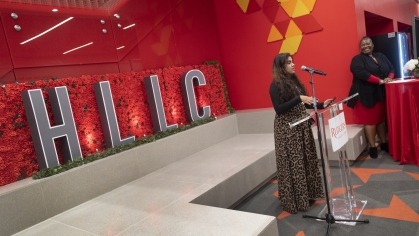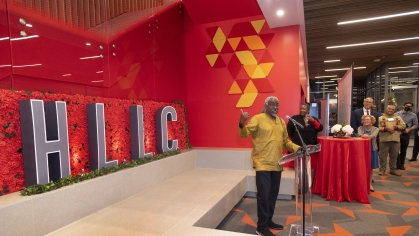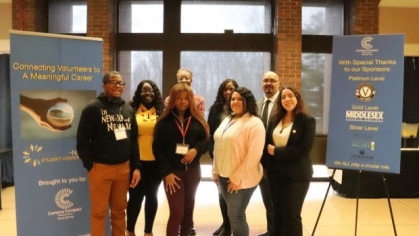Honors Living-Learning Community Welcomes Six New Faculty Mentors
The Honors Living-Learning Community (HLLC) at Rutgers University–Newark (RU-N) welcomes six new faculty mentors for the fall 2016 incoming HLLC class.
The recent appointees are Jason Bird, assistant professor in the Department of Social Work, Faculty of Arts and Sciences (FASN), Taja-Nia Henderson, associate professor at Rutgers Law School; Jyl Josephson, associate professor in the Department of Political Science, FASN; Kristina Keating, assistant professor in the Department of Earth and Environmental Sciences, FASN; Kusum Mundra, associate professor in the Department of Economics, FASN; and Alexander Sannella, associate professor of accounting at Rutgers Business School.
Established in 2015, the HLLC is an innovative RU-N initiative that is revolutionizing honors and redefining the notion of “honors” by creating intergenerational and interdisciplinary learning communities comprised of students, faculty, and community partners focused on tackling some of the nation’s most pressing social issues. Dynamic students are selected to join a living-learning community and intergenerational network across all intersections of identity focused on cultivating knowledge, fostering understanding across and within groups, and activating social, institutional, and cultural change.
The HLLC endeavors to increase access to higher education for academically promising, talented, and civic-minded individuals who may be overlooked when relying solely on standard academic indicators for college success. Utilizing a holistic admissions rubric, the HLLC is able to identify exceptional first-year students and community college transfers from Newark and Greater Newark, while also extending its reach to other national and international regions.
HLLC scholars participate in a shared interdisciplinary curriculum built upon themes related to “local citizenship in a global world.” The curriculum promotes critical intellectual inquiry, increases cultural competence, and explores what it means to be a responsible citizen, both locally and globally. RU-N faculty members have been critical partners in the development of the HLLC and will continue to play central roles as collaborators in its growth and success, including the creation of the HLLC curriculum.
“The educational leaders designing the HLLC, with their own personal experiences and expertise at the vanguard of programs for access and opportunity, inter-group relations, and publicly-engaged scholarship, understand how critical it is to take an expansive approach to cultivating wisdom simultaneously at the intersection of students, faculty, and community partners,” explains RU-N Chancellor Nancy Cantor. “To fulfill its public mission, RU-N has collectively engaged in examining who we are, and what we can become in an inclusive way, from students to faculty to community partners.”
“Faculty mentors play a prominent role in the success of our HLLC scholars and the program overall. Research shows that mentorship is an important factor in college retention,” notes Marta Esquilin, associate dean of the HLLC. “We seek mentors who are comfortable engaging our diverse student population around all aspects of identity, including, but not limited to race, ethnicity, gender, age, sexual orientation, citizenship, faith, socioeconomic status, personal interests, course of study, etc.”
Faculty mentors provide holistic support to HLLC scholars to address various components of the college experience, including academic, social, and personal matters. Mentors serve as guides for students in their journeys as budding scholars and toward successful degree completion. Equipped with a curriculum designed to help students acclimate to college life and each other, each faculty mentor is responsible for supporting 10 HLLC scholars, each of whom must meet with his or her faculty mentor biweekly as a group and individually.
The new HLLC faculty mentors consider it an honor and a privilege to serve in this role. Sannella shares, “My life was significantly changed and transformed by those special individuals who took the time to give me the courage and confidence to see a challenge as an opportunity. At times they had to convince me that I had the ability to succeed and with discipline and dedication, I could achieve any goal that I set for myself. I was taught that I should continually reach high and chase perfection so that at worst, I would catch excellence on the way down. Although, I have mentored students throughout my career as a college educator, the HLLC is an amazing and exciting opportunity for me to concentrate my efforts on mentoring these very talented young men and women.”
To prepare for their impending commitment, Bird, Henderson, Josephson, Keating, Mundra, and Sannella will participate in a three-day training session in August and a supplemental refresher course during winter recess. To further enhance the support network throughout the academic year, the HLLC leadership team will facilitate biweekly meetings with the faculty mentors.
”Having matched the faculty mentors’ strengths and skills to the HLLC scholars’ interests, needs, backgrounds, and experiences, we’re confident in the faculty mentors’ abilities to foster communities of support and transformation, encourage an open exchange of ideas, and create connections to classroom, campus, and community,” Esquilin states. “Jason, Taja-Nia, Jyl, Kristina, Kusum, and Alexander bring a wealth of expertise and knowledge to the HLLC, and I’m looking forward to working with them.”
Photo (left to right, clockwise): Kusum Mundra, Jason Bird, Taja-Nia Henderson, Alexander Sannella, Kristina Keating, Jyl Josephson


